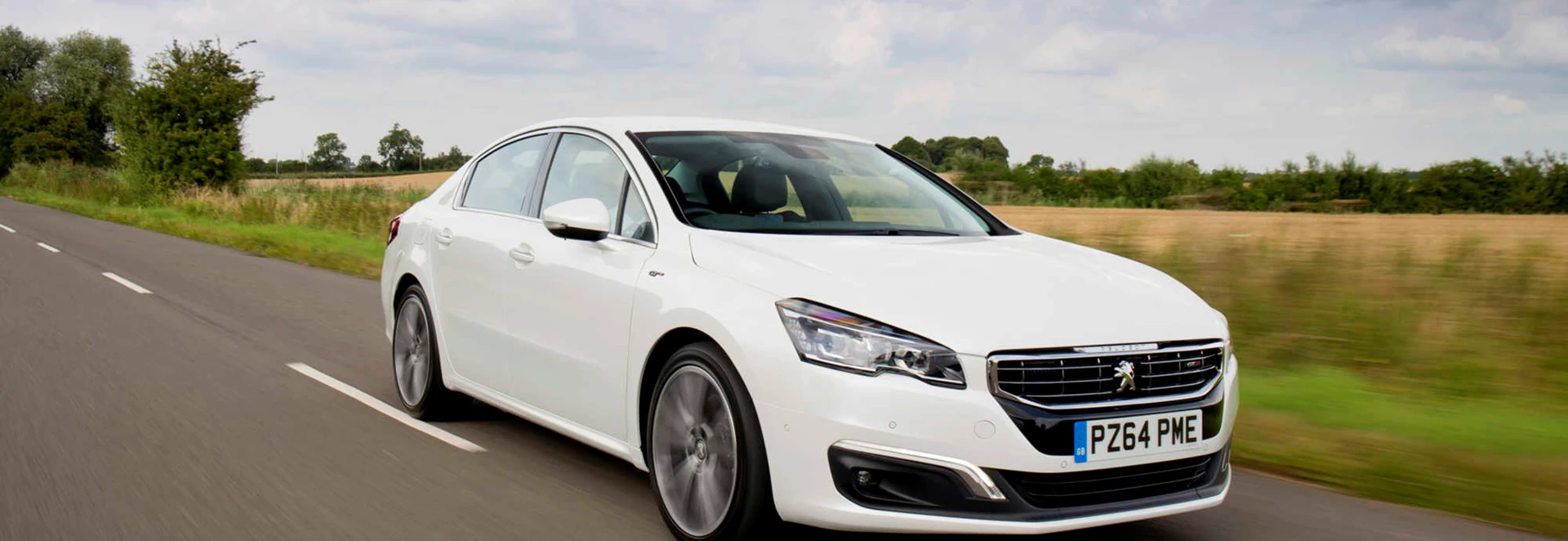Peugeot has struggled on the big-car front for years, with its 407 failing to make its mark in this saturated market full of Ford Mondeos, Vauxhall Insignias and Volkswagen Passats.
When the 508 launched back in 2011, it was important for Peugeot to show it was capable of producing a credible alternative to the saloon stablemates. To achieve this, it not only introduced a good-looking saloon, but also overhauled the interior quality.
Private customers and fleet drivers would both suit the sleek stylish of the Peugeot 508 saloon.
Performance
This 2.0-litre 150bhp diesel Blue HDI engine hits 62mph in a respectable 9.8 seconds, with a maximum speed of 131mph.
The six-speed manual has notably small ratios between lower gears that could be improved making it notchy, but otherwise it’s a smooth ‘box that is well engineered to the unit.
Still, a roughly equivalent Ford Mondeo, the 2.0 TDCi 163 Titanium X Business Edition, is quicker at 8.9 seconds, but a VW Passat 2.0 TDI with 138bhp matches the 508 at 9.8 seconds.
Along with our tested engine, there are also a 1.6 e-HDi, pacier 2.0-litre HDi Hybrid4 and HDi units and the 2.2 HDi GTi model, which is the quickest in the range.
Depending on the version chosen, the engine will be mated to either a six-speed manual, six-speed EGC or six-speed automatic transmission.
Ride and Handling
Steering is well-weighted with good levels of feedback. Ride is also impressive, perfectly suiting the long motorway journeys that will befit this car’s usage, while wind and engine noise are kept to a minimum.
The 508 drives much better than you’d expect for a run-of-the-mill saloon, offering a comfortable ride for all passengers while managing good body control around corners and excellent front-end grip. Steering is well-weighted with good levels of feedback. Ride is also impressive, perfectly suiting the long motorway journeys that will befit this car’s usage, while wind and engine noise are kept to a minimum. In short, the model is a dramatic step up from the 407, closing the gap for overall driving enjoyment, and becoming a realistic rival to the class leaders.
Interior and Equipment
The model features as part of a plot point in James Rollins’ Sigma Force Book 6.5: ‘The Skeleton Key’.
The interior of the 508 is excellent, closely rivalling premium German brands. Good quality plastics and neat design make for an appealing aesthetic, while the dial clusters are clear and well-designed. The downfall of the cabin is a lack of space for bits and pieces; the central console between driver and passenger seats has no room whatsoever, aside from the armrest compartment which is also much smaller than average. With the rear seats in place, the 508 has a boot volume of 473 litres, with the hybrid version having a reduced 339 litres. Equipment on this high-spec Allure trim is ample, with highlights including front and rear parking aids, heated front seats, 18-inch alloys, and Bluetooth. Our test car also had the colour head-up display as a £310 option.
Cost
The best efficiency figures in the range go to the 508 Hybrid4, which returns up to 80.7mpg, while emitting just 91g/km of CO2 – putting it in VED band ‘A’.
This frugal engine offers plenty of punch without running costs suffering – emissions of 109g/km of CO2 mean a tax-free first year of ownership, followed by a £20 annual cost. It also offers a claimed fuel consumption of 67.3mpg, all of which makes it an appealing case for business car drivers, who are vital in this sector. Still, it’s not the cheapest. The Ford Mondeo 2.0 TDCi 163 Titanium X Business Edition costs £23,495, compared to our tested 508 at £25,195. But the Peugeot wins on running costs, with the Ford emitting 119g/km of CO2 with an official combined figure of 62.8mpg. The best efficiency figures in the range go to the 508 Hybrid4, which returns up to 80.7mpg, while emitting just 91g/km of CO2 – putting it in VED band ‘A’. Residual values are likely to be poor for the Peugeot 508, especially when compared to the likes of the VW Passat.
Our Verdict
The 508 isn’t necessarily better than its more established rivals, but it is certainly on a par, offering an excellent all-round package of driving dynamics, comfort, space and spec. Not only has Peugeot created a family saloon that should make people sit up and take notice, but its interior quality even seeps into premium German brand territory. This is a car to seriously consider. Those looking for an eco-friendly saloon should consider the Hybrid4 version, which would be perfect for fleet drivers – especially with the low BiK tax rates and exemption from the London Congestion Charge.




